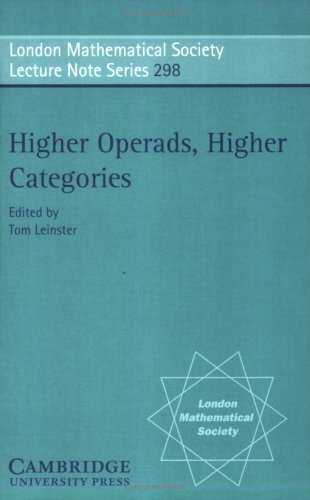
Higher Operads, Higher Categories
by Tom Leinster
Publisher: arXiv 2003
ISBN/ASIN: 0521532159
ISBN-13: 9780521532150
Number of pages: 410
Description:
Higher-dimensional category theory is the study of n-categories, operads, braided monoidal categories, and other such exotic structures. It draws its inspiration from areas as diverse as topology, quantum algebra, mathematical physics, logic, and theoretical computer science. This is the first book on the subject and lays its foundations.
Download or read it online for free here:
Download link
(3MB, PDF)
Similar books
 Basic Category Theory
Basic Category Theoryby Tom Leinster - arXiv
This introduction to category theory is for readers with relatively little mathematical background. At its heart is the concept of a universal property, important throughout mathematics. For each new concept a generous supply of examples is provided.
(8666 views)
 Introduction to Categories and Categorical Logic
Introduction to Categories and Categorical Logicby Samson Abramsky, Nikos Tzevelekos - arXiv
These notes provide a succinct, accessible introduction to some of the basic ideas of category theory and categorical logic. The main prerequisite is a basic familiarity with the elements of discrete mathematics: sets, relations and functions.
(12941 views)
 Toposes, Triples and Theories
Toposes, Triples and Theoriesby Michael Barr, Charles Wells - Springer-Verlag
Introduction to toposes, triples and theories and the connections between them. The book starts with an introduction to category theory, then introduces each of the three topics of the title. Exercises provide examples or develop the theory further.
(15019 views)
 Category Theory for the Sciences
Category Theory for the Sciencesby David I. Spivak - The MIT Press
This book shows that category theory can be useful outside of mathematics as a flexible modeling language throughout the sciences. Written in an engaging and straightforward style, the book is rigorous but accessible to non-mathematicians.
(7845 views)